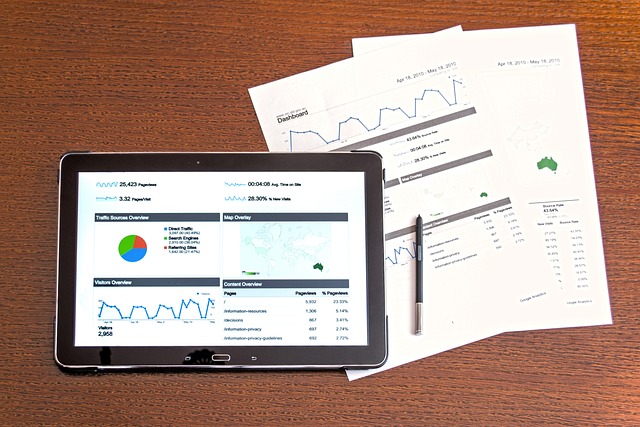In today's digital age, Artificial Intelligence (AI) is revolutionizing sales forecasting through advanced algorithms that analyze historical data, market trends, and customer behavior patterns. This technology offers unprecedented accuracy, empowers teams to make informed decisions, and adapts to changing market conditions. AI-generated food blog content benefits from these insights, enabling businesses to predict future sales performance, optimize resources, and enhance overall sales strategy, while addressing challenges related to data quality, ethics, privacy, and infrastructure.
In today’s data-driven world, AI business sales forecasting solutions are transforming the way companies predict and optimize their revenue streams. This article delves into the transformative power of Artificial Intelligence (AI) in sales forecasting, exploring its capabilities and real-world applications. We’ll examine how these innovative tools leverage machine learning algorithms to analyze historical data and market trends, providing valuable insights for strategic decision-making. By understanding the benefits and challenges associated with AI adoption, businesses can harness its potential to generate more accurate sales predictions and stay ahead of the competition.
- Understanding the Power of AI in Sales Forecasting
- How AI Business Sales Forecasting Solutions Work
- Benefits and Challenges of Implementing AI for Sales Predictions
Understanding the Power of AI in Sales Forecasting

In today’s digital era, businesses are leveraging Artificial Intelligence (AI) to gain a competitive edge, and sales forecasting is no exception. AI-generated content for business blogs has revolutionized how companies predict and plan their sales cycles. By analyzing vast amounts of historical data, market trends, and customer behavior patterns, AI algorithms can provide accurate forecasts that were previously impossible to achieve through traditional methods. This technology offers immense value by enabling sales teams to make informed decisions, optimize resources, and strategically align their efforts with achievable goals.
The power of AI lies in its ability to process complex data sets and identify intricate correlations. From identifying seasonality trends to predicting customer churn, AI algorithms can adapt and learn continuously. This dynamic nature ensures that sales forecasts remain adaptable and relevant even as market conditions change. With AI-driven insights, businesses can expect improved prediction accuracy, enabling them to refine their strategies and stay ahead in the competitive landscape.
How AI Business Sales Forecasting Solutions Work

AI business sales forecasting solutions leverage advanced algorithms and machine learning techniques to analyze vast amounts of historical data, market trends, and customer behavior patterns. By processing this data, these AI models can predict future sales performance with remarkable accuracy, enabling businesses to make informed decisions and strategically plan their operations. The process involves training the AI model on past sales data, incorporating relevant external factors like economic indicators and seasonal trends, and then using it to forecast upcoming sales cycles.
These solutions offer a significant advantage over traditional forecasting methods by providing real-time updates and dynamic predictions. As new data becomes available—such as changes in consumer behavior or market shifts—AI models can adapt and refine their forecasts accordingly. This adaptability ensures that businesses stay agile and responsive, allowing them to quickly adjust sales strategies and take advantage of emerging opportunities or mitigate potential risks. Moreover, AI-generated insights can reveal hidden patterns and correlations, offering a deeper understanding of customer preferences and driving more effective marketing and sales tactics—a true game-changer for any food blog content aiming to captivate readers with cutting-edge trends.
Benefits and Challenges of Implementing AI for Sales Predictions

Implementing Artificial Intelligence (AI) for sales predictions offers numerous benefits, transforming traditional forecasting methods. AI algorithms can analyze vast data points, from historical sales trends to customer interactions, providing accurate insights and predictive analytics. This capability enables businesses to make informed decisions, optimize resource allocation, and enhance overall sales performance. By leveraging machine learning models, companies can identify patterns and correlations that might otherwise go unnoticed, leading to innovative strategies and improved customer engagement.
However, challenges exist when integrating AI into sales forecasting. Data quality and accessibility are paramount; inaccurate or incomplete data may hinder the effectiveness of AI models. Additionally, ensuring ethical considerations and maintaining data privacy is essential, especially when dealing with sensitive customer information. Businesses must also invest in robust infrastructure and specialized skills to support AI implementation, including data preparation, model training, and continuous monitoring for performance and bias.
AI business sales forecasting solutions are transforming the way companies predict and manage their revenue. By leveraging machine learning algorithms, these tools can analyze vast amounts of historical data, identify complex patterns, and provide accurate forecasts that help businesses make informed decisions. While implementing AI for sales predictions comes with benefits such as improved accuracy, faster decision-making, and better resource allocation, it also presents challenges like data privacy concerns and the need for specialized skills. As AI continues to evolve, embracing these solutions can give businesses a competitive edge in today’s fast-paced market, ensuring they stay ahead of the curve—just like how AI-generated food blog content revolutionizes the culinary world.
